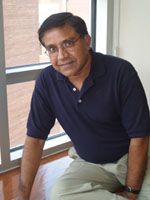Lab to provide custom approach to
therapy
by Mary
Helen YarboroughPublic Relations
A new lab in the Hollings Cancer Center (HCC) will help doctors evaluate tissue samples from their cancer patients to determine what drug would be the best treatment, or whether a new drug should be developed to treat a specific cancer.
 Dr. Sandeep Mahajan
Dr. Sandeep MahajanThe Translational Research Core Lab, which opens in late July or August, would provide an interface with doctors from MUSC and across the state to access the best possible therapies for their patients. Drug therapies, whether new, established or under development, would provide a customized approach according to the patient, the cancer and the complexities that each case presents.
“This would be an excellent research-shared resource for doctors wanting to evaluate clinical samples for specific molecular changes,” said the lab’s director, Sandeep Mahajan, Ph.D., assistant professor of research. “This core will enable researchers to do micro-array analyses of patient samples.”
Drug therapy would be based upon the individual characteristics of a cancer and would be linked to investigational and approved drugs for treatment, said Mahajan, who came to MUSC from Minnesota two-and-half years ago to conduct cancer research.
The research lab would not provide a cancer diagnosis, since that would have already been done, Mahajan said. But since every cancer is different, the drug therapy recommended may also differ depending on what exactly is the problem.
“Cancer is such a broad diagnosis. There are hundreds of things that could go wrong,” Mahajan said. “By looking at all of the genetic or biochemical levels; looking at any changes in hormones or enzyme levels in the patient; this helps us determine what would work.”
Because cancer moves from organ to organ, lung cancer, for instance, may have originated in a kidney in one patient. So the kidney would contain the original problem, Mahajan said. Researchers would have to determine what originally happened, then look at various biochemical levels and changes to prescribe how to stop the spread and growth of the cancer.
Mahajan is an expert in molecular biology and viral vector research. He said an enzyme, for example, could differ at the genetic level and could cause the same type of cancer to behave differently in two people.
“We would identify existing drugs and drugs in clinical trials that doctors can access for their patients,” Mahajan said.
The lab would not be limited to clinical trials in which MUSC is participating, but also would include any national clinical trial.
“This facility will provide expertise for drug evaluation and for clinical trials,” he said, adding that information collected in the lab could lead to new drug research and development.
Viral vectors
Mahajan also plans to operate another lab within the same facility to provide viral vector core research. Viral vectors are used in gene therapy, and have proven very efficient in human applications.
“We can clone genes into viral vectors, which can be used in cancer cell tests,” Mahajan said. “But this would not be limited to cancer research. We could apply the viral vector research to cancer and other diseases. This is more of a basic research lab that is available for more than just cancer.”
This core will also function to make viral vectors for research laboratories, Mahajan said. These vectors would include lentiviral, adenoviral, and retroviral expression of genes including so-called shRNA for laboratory research.
Recruited to HCC from private industry where he performed drug discovery research, Mahajan has worked for more than 15 years in the area of molecular and cellular biology with expertise in DNA, RNA, protein and immunological techniques.
Friday, July 4, 2008
Catalyst Online is published weekly,
updated
as needed and improved from time to time by the MUSC Office of Public
Relations
for the faculty, employees and students of the Medical University of
South
Carolina. Catalyst Online editor, Kim Draughn, can be reached at
792-4107
or by email, catalyst@musc.edu. Editorial copy can be submitted to
Catalyst
Online and to The Catalyst in print by fax, 792-6723, or by email to
catalyst@musc.edu. To place an ad in The Catalyst hardcopy, call Island
Publications at 849-1778, ext. 201.